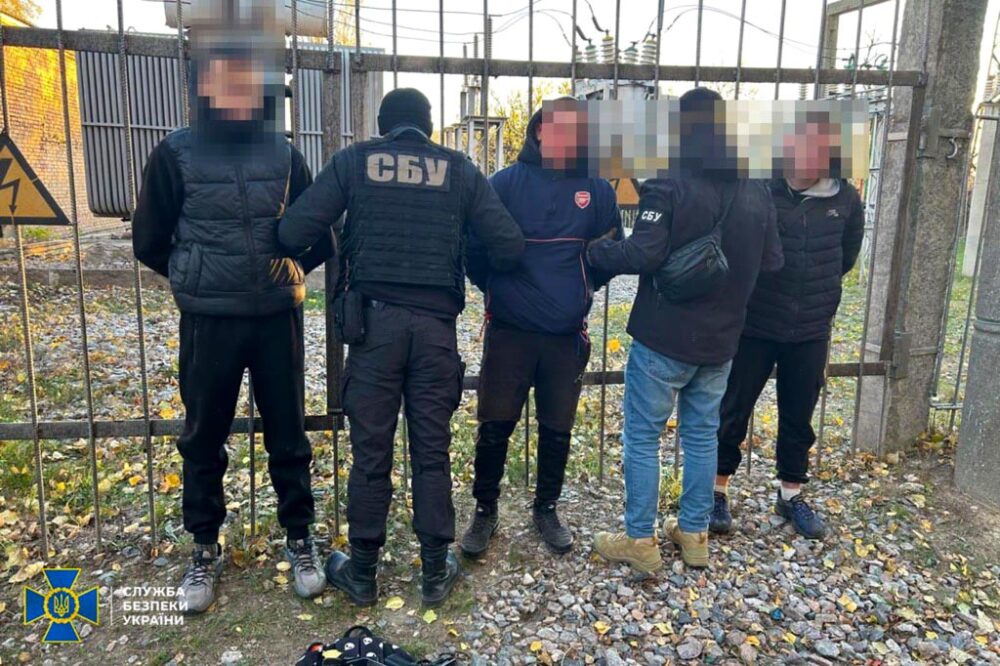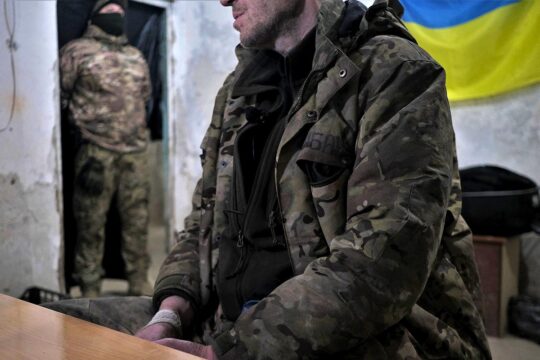Last year, several military SUV vehicles were set on fire in Kropyvnytskyi, in central Ukraine. Power substations and even a helicopter of the local flight academy were also burnt. According to Ukrainian investigators, the arsonists were four local teenagers, while another one “kept guard”, who have been recruited by the Russian intelligence Service (FSB). One of them has been convicted, while the trial of the three others are awaiting trial.
Proceedings in absentia has also begun before the same District Court of Kropyvnytskyi, against the FSB operatives. According to the case file, Russian FSB operatives Yevhen Kozhemiakin and Oleksandr Suslyakov used Telegram for recruiting the young Ukrainians and tasking them with setting military vehicles, as well as public infrastructure facilities, on fire.
Reshaping public opinion
Among those recruited were four Kropyvnytskyi residents – two of them were 15 and 17 years old, and the other two were 18. The boys were charged with seven criminal charges, including attempted sabotage committed by a group of people in collusion.
According to the investigators, these actions are aimed at reshaping public opinion, by showing that people in Ukraine support Russia and defy the Ukrainian armed forces. Russian special services host a special Telegram channel through which they offer considerable money for setting fire to vehicles and power substations. The payments are made with cryptocurrency.
In August last year, 17-year-old Danylo D. found a Telegram channel run by the FSB operatives. He received an offer to set the vehicles of the Ukrainian Armed Forces on fire for money. A mandatory condition was to record the arson on video.
Together with his 15-year-old friend Mykyta P., Danylo bought gasoline and set fire to the SUV of a Ukrainian military gunner in the middle of the night. The boys recorded the burning on video and escaped. Mykyta set fire to a vehicle on another occasion on his own, after coordinating it with the FSB operative through the same Telegram channel.
Soon after, Danylo and another of his friends, 18-year-old Rustam G., set fire to two military SUVs. One night, they broke into a local airfield and tried to burn down a MI-2 helicopter, property of the flight academy. The boys videotaped themselves pouring gasoline on the helicopter and setting it on fire. However, the fire was put out by rain.
Then the boys decided to start setting fire to power substations. They damaged a substation in Kropyvnytskyi, but the teenagers were detained during an attempt to set fire to a voltage transformer in the village of Pervozvanivka, located near the regional capital. In addition to Danylo and Rustam, law enforcement officers apprehended 18-year-old Vladyslav S. The boy “kept guard” while his associates were cutting barbed wire surrounding the substation. The FSB operatives were paying from 700 to 1600 euros per action in cryptocurrency. Danylo was the one who received most of the money.
Minored sentence after a guilty plea
So far, only one of the teenagers has been sentenced, in May 2025 – 18-year-old Vladislav S., who kept guard while his friends attempted to burn down the power substation. Unlike the other young men, Vladislav was charged with attempted intentional damage to an electrical power facility. This offence is subject to a less severe penalty than sabotage.
The verdict states that his friends offered Vladislav 10,000 UAH [200 euros] for helping them. However, he allegedly did not know that his associates were acting on the instructions of the FSB. And during the court hearing, Vladislav, who was a minor at the time, pleaded guilty. He signed a plea agreement with the prosecutor’s office.
The judge of the Kropyvnytskyi District Court sentenced him to two years of probation. He will have to attend meetings with the probation authority during his non prison term. He should also comply with the “Life skills development” probation programme. In addition, the court ruled that the young man should read the book Kruty 1918 – a patriotic historical drama telling the story of a battle near the town of Kruty (north-east of Kyiv) between young military cadets of the Ukrainian People’s Republic and the occupation forces of Soviet Russia.
Crimes against national security
The three other young men involved in the arson attacks were taken into custody after their arrest. However, at the end of last year, the court released one of them under his mother’s supervision. Another one was ordered to house arrest.
According to court rulings, the searches of the teenagers’ possessions revealed balaclavas, gloves, several iPhones and a receipt for the purchase of an airgun. At the end of May this year, the Kropyvnytskyi District Court began considering an indictment against them. They are charged with crimes against national security. This includes obstructing the legitimate activity of the Armed Forces of Ukraine, attempted sabotage, and intentional destruction of property committed by a group of people.
Recruitment of children, a war crime
The FSB operatives Kozhemiakin and Suslyakov are also charged by the Ukrainian prosecutors with a crime against national security – planning of sabotage. The local court have started proceedings against them in absentia. The two Russians have been included in the nationwide wanted list.
Furthermore, Ukrainian human rights activists and representatives of the Prosecutor General’s Office have voiced their opinion that the recruitment of children by Russia to make them participate in the war is to be considered a war crime.
For instance, Andriy Yakovlev, a lawyer and expert at the Media Initiative for Human Rights, explained that the arson attacks on military vehicles seek to obstruct mobilisation. Therefore, they can be interpreted as participation in enemy military operations. In his opinion, such operations widely meet the definition of “participation in the hostilities”.
And according to the Rome Statute of the International Criminal Court, recently ratified by Ukraine and that officially entered into force on 1 January 2025, the involvement of children in hostilities is considered a war crime.
According to Andriy Yakovlev, an accurate qualification of the Russians’ actions increases the chance of their eventual prosecution. War crimes have no statute of limitations.
Yuriy Belousov, Head of the War Department of the Prosecutor General’s Office, recently stated that the involvement of minors in combat is a war crime and that a guidance letter has been sent to all regional public prosecutors’ offices.
This report is part of our coverage of war crimes justice produced in partnership with Ukrainian journalists. A first version of this article was published on the « Gre4ka » website.







